Arriving into Cairo I catch my first sight of the Nile: ancient, flowing, mythical … There is something about the energy of this place – in the old city, in the alleyways and souks…in spite of the violence, the riots and the crackdowns…and I am so glad to be here.
The ancient rhythms are still much in evidence, even in Zamalak quarter, home to embassies and expats. I can see the Nile from my hotel room – it feels like a mystic river thread unspooled, weaving under Qasr El Nil Bridge with the humdrum of local life there and then so far beyond.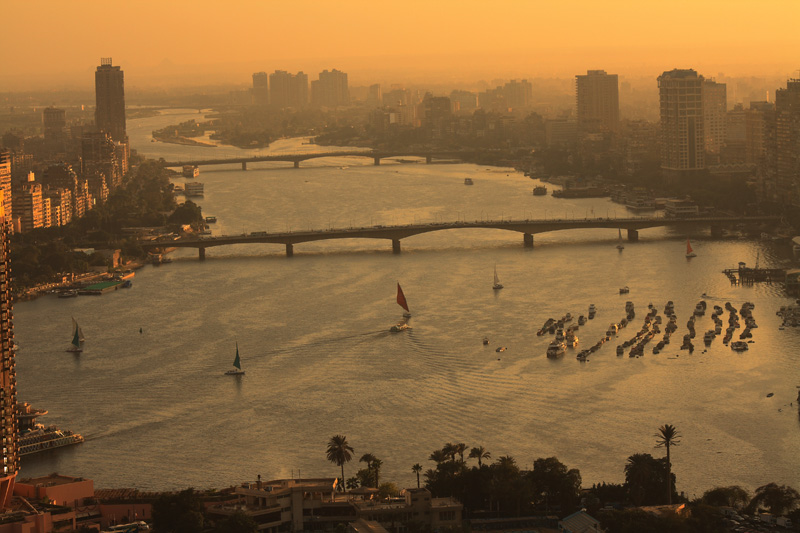
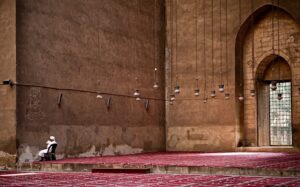 In Cairo you can see 3000 year-old treasures in the Egyptian Museum and you can experience a rare peace and silence in Soltan Hassan mosque. And then, of course, there’s Tarhir Square, site of the Arab Spring and so many other citizen uprisings. This was the place where in February 2011 women marched with men and stood their ground in spite of Mubarak’s thugs and snipers. Dozens of women were subsequently attacked and raped by male mobs and then many were forced to undergo strip searches and Virginity tests by military officers, effectively another form of rape.
In Cairo you can see 3000 year-old treasures in the Egyptian Museum and you can experience a rare peace and silence in Soltan Hassan mosque. And then, of course, there’s Tarhir Square, site of the Arab Spring and so many other citizen uprisings. This was the place where in February 2011 women marched with men and stood their ground in spite of Mubarak’s thugs and snipers. Dozens of women were subsequently attacked and raped by male mobs and then many were forced to undergo strip searches and Virginity tests by military officers, effectively another form of rape.
As the activist writer Mona Eltahawy wrote, “This obsession with controlling women’s bodies often stems from the suspicion that, without restraints, women are just a few degrees short of sexual insatiability.” Take for instance the view of popular Egyptian cleric, al-Qaradawi, who said that ‘Anyone who thinks (female) circumcision is the best way to protect his daughters should do it. The moderate opinion in favor of practicing circumcision is to reduce temptation.’ (Headscarves and Hymens)
I was in Cairo with one of my colleagues and with human rights photographer Alissa Everett, to visit some of Global Fund for Women’s grantee partners. We wanted to hear and capture what women’s human rights groups and movements were facing in Egypt and what they saw as essential to advance women’s human rights in the time ahead. I can’t tell you the names of many of the groups supported as their existence and work remains confidential due to security concerns and so they will remain anonymous here too.
Many of the groups we visited were working to amend personal status laws in Egypt. These laws means that women inherit half the amount that men inherit and while men can freely divorce their wives, women are often forced to return to their husbands if they file for divorce, especially if children are involved. The existence of this code means that a woman often needs the permission of a male guardian to marry too, even if she is a widow. Experience has shown that it is difficult to amend personal status laws in Egypt because of the resistance of the society and conservative religious groups. The re-islamization of the Egyptian society has made it even more difficult to re-examine all personal status laws and codify them in a single code. This is exacerbated by the lack of state political will and the preference to retain the status quo.
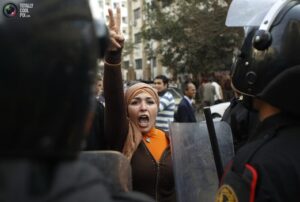 Since the time of the Arab Spring uprising, and coupled with rising economic insecurity, there has been increased gender based violence, an increase in women being trafficked, displacement and concern over the rule of law. In addition, the harsh crackdown by the government on non-government organizations (NGOs) means all funds provided by donors to NGOs in Egypt are held up by the government for at least 6-9 months before being released. This means many NGOs have difficulty paying their rent and paying their staff with many employees forced to volunteer to keep the doors of their organization open while they struggle to keep their families fed and clothed. This situation has also resulted in a shrinking space for women NGOs in Egypt at a time when their perspectives need to be heard locally and globally. To exacerbate this situation, an increasing number of donors have stopped funding in the Middle East, saying it is too difficult, stressful and complicated.
Since the time of the Arab Spring uprising, and coupled with rising economic insecurity, there has been increased gender based violence, an increase in women being trafficked, displacement and concern over the rule of law. In addition, the harsh crackdown by the government on non-government organizations (NGOs) means all funds provided by donors to NGOs in Egypt are held up by the government for at least 6-9 months before being released. This means many NGOs have difficulty paying their rent and paying their staff with many employees forced to volunteer to keep the doors of their organization open while they struggle to keep their families fed and clothed. This situation has also resulted in a shrinking space for women NGOs in Egypt at a time when their perspectives need to be heard locally and globally. To exacerbate this situation, an increasing number of donors have stopped funding in the Middle East, saying it is too difficult, stressful and complicated.
In addition to girls being trafficked, many are forced into marriage as a result of Gulf men and agents using women and men in local villages as brokers. They become resource persons who are very well known and can help with approaching families and negotiating payment for a girl. While girls are supposed to be 18 to marry, agents produce fake birth certificates to support the marriage going ahead. As a result a girl may end up being trafficked to Saudi Arabia or Kuwait and become a sex slave to an old man where she may face a high degree of sexual violence or find she is married to a man with several other wives also treated as slaves. The youngest, most virginal of girls attract the highest price…
“Traffickers sell girls as young as eleven or twelve for as much as $30,000 while other ‘used’ girls and women can be bought for as little as $2,000. The traffickers are aided by sophisticated criminal network that are able to forge documents and pay corrupt officials to remove impediments.” (The Unfinished Revolution – voices from the global fight for women’s rights – edited by Minky Worden)
Women’s groups have been countering this trend by conducting awareness training including working with victims and potential victims and mobilizing local communities through workshops and roundtables, and encouraging community mobilization and leadership to stop such practices.
Economic conditions continue to push girls into transactional marriages, so vocational training skills are critical in order for girls and young women to have options for income and independence. Another organization funded by Global Fund for Women helps women to know their rights and support their access to work such as dressmaking from home as part of a domestic workers network in rural areas where job options are few. These women are also taught conflict resolution skills, self-expression, legal literacy and negotiation. Importantly, this approach is rights based rather than charity based since, as one staff person reflected, “charity quiets the problem rather than resolves it.” As another staff person observed, “We must not separate economic empowerment from the rights awareness training in order for women in this country to be free.”
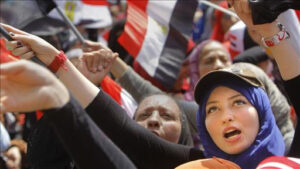 And yet in spite of these challenges, there is the unstoppable rise of the young feminist movement, supported by such initiatives as a feminist school where young women discuss what feminism means to them; feminist ways in Egypt; the current context for women’s human rights organizing; addressing violence against women and combating fundamentalism. There is also a ten day feminist political training school that engages young women who have a progressive agenda across a spectrum of political issues in Egypt. The curriculum for this activist school covers information on political process and parties, the importance of gender sensitive agenda, discussion of gender based violence and sexual violence and the need for legal and policy reform.
And yet in spite of these challenges, there is the unstoppable rise of the young feminist movement, supported by such initiatives as a feminist school where young women discuss what feminism means to them; feminist ways in Egypt; the current context for women’s human rights organizing; addressing violence against women and combating fundamentalism. There is also a ten day feminist political training school that engages young women who have a progressive agenda across a spectrum of political issues in Egypt. The curriculum for this activist school covers information on political process and parties, the importance of gender sensitive agenda, discussion of gender based violence and sexual violence and the need for legal and policy reform.
The energy around women’s political engagement is strong in the knowledge that getting more women into local and national political positions represents a powerful opportunity to secure the kinds of policy changes and laws needed to advance women’s human rights. While we were there, many groups were preparing for the forthcoming Parliamentary election where there was a quota system in place – of the 120 seats, 56 need to be women. There is also work underway to bring together women Parliamentarians as well as women activists to discuss how to secure the kinds of policy changes and laws needed to advance women’s human rights. In doing this work, the President of the organization observed, “Those NGOs working on democracy are surrounded right now (by government security and crackdowns) but some work on women’s human rights can go on under the radar.”
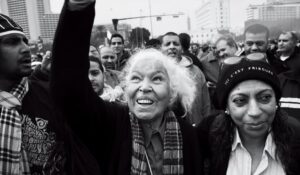 Another group supported by Global Fund for Women has as its mission to build an equal society free of discrimination and marginalization with a women’s rights focus. A key part of its work is to support women as candidates for election at both local and national levels. This includes establishing syndicates such as the first ever syndicate for domestic workers’ as a means to address the very low standards that Egypt retains for domestic workers.
Another group supported by Global Fund for Women has as its mission to build an equal society free of discrimination and marginalization with a women’s rights focus. A key part of its work is to support women as candidates for election at both local and national levels. This includes establishing syndicates such as the first ever syndicate for domestic workers’ as a means to address the very low standards that Egypt retains for domestic workers.
As the President of the organization explains, “In Egypt there are about one third of families who are women-led households — divorced, widowed, separated — and 95% of these women have no organizations to support them as a movement. Well organized women working in a syndicate can defend themselves better than individual women.”
This work in getting women elected is supported by Egypt’s new Constitution that requires 25% of the representation of local councils to be women and young people and at least 50% of this 25% must be women. As the head of the organization explains, “This means we have to prepare at least 5,000-10,000 women to stand for office and to understand how to defend the Constitution and women’s rights in the Constitution, including those needing protection through new laws. We need to encourage women who have progressive agendas and who can represent women working in villages to ensure diversity of representation. Women are unstoppable in villages if they want to stand.”
The influence of women’s movements on the political process has already been evident – women’s movements’ advocacy to address rising harassment and violence against women resulted in Egypt’s National Council of Women publishing a national strategy to combat violence. It has also been the advocacy and work of the women’s movement that has created legislation to address sexual harassment and to end the social acceptability of sexual harassment in Egypt on the streets, in schools, work places and in universities.
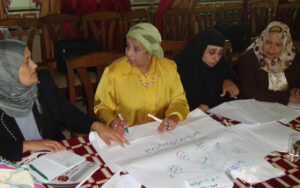 Many of the groups supported by Global Fund for Women see the work of influencing the attitudes and oratory of Muslim religious leaders as being key to addressing the culture of violence and progressing changes to advance women’s human rights. One of these groups works with Muslim religious leaders and their approach involves sharing with these leaders what Muslim religious leaders have experienced in other regions and how they have interpreted the Koran in relation to women’s rights. From here the group embark on a dialogue on how that relates to Egypt. As one staff person said to me “When religious leaders are engaged in a conversation about how other religious leaders have responded to a situation they can see their own role and participation in a new light.”
Many of the groups supported by Global Fund for Women see the work of influencing the attitudes and oratory of Muslim religious leaders as being key to addressing the culture of violence and progressing changes to advance women’s human rights. One of these groups works with Muslim religious leaders and their approach involves sharing with these leaders what Muslim religious leaders have experienced in other regions and how they have interpreted the Koran in relation to women’s rights. From here the group embark on a dialogue on how that relates to Egypt. As one staff person said to me “When religious leaders are engaged in a conversation about how other religious leaders have responded to a situation they can see their own role and participation in a new light.”
“What is important here,” said the organization’s director, “is that we don’t work on Koranic verses only, we work on the comprehensive heritage of the Islamic religion, the jurisprudence. It’s important to train religious leaders on new interpretations of Sharia law and also to support them in their own leadership through communication and listening skills. The leaders we worked with told their friends about it and so 25 more religious leaders came to us asking for the same training. Theirs is an archaic institution and so they loved different approaches they’d never tried before such as role playing rather than being formal in all their communication. They loved the freedom, the active participation and sharing. On the first day of training these men came in full religious attire and the next day they came in casual clothes. Many of these religious leaders wanted to take what they had learnt and to apply it – rather than standing and giving a sermon, they would be writing on a flipchart while giving prayers. In this way, we have trained about 450 religious leaders to reflect on their interpretation of Islam and to act accordingly.”
After every training there is a follow up in terms of the actions undertaken as a result of the training. The main goal of training is making them leaders within their community and to ensure that they are attuned to the rights of women.
“Where, after all, do human rights begin? In small places, close to home – so close and small that they do not appear on any map of the world. Yet, they are of the world of the individual person: The neighborhood he lives in; the school or college he attends; the factory, farm or office where he works. Such are the places where every man, woman and child seeks equal justice, equal opportunity, equal dignity without discrimination. Unless these rights have meaning there, they will have little meaning anywhere. Without concerted citizen action to uphold them close to home, we shall look in vain for progress in the larger world.”
Eleanor Roosevelt, March 27 1958 at the new headquarters of the United Nations in New York
Another organization works with religious leaders in the belief that doing this is one of the most important ways to change attitudes and cultural norms. This group sought to discuss women’s issues with some of the most conservative religious leaders in Egypt and it conducted three roundtables, calling them the ‘meeting of experts.’ These three roundtables comprised women’s personal status; right to work and other legal rights; and Koranic verses related to violence. At each of these roundtables, the group was seeking to provoke thoughts and conversations. The goal was to encourage a view that religion doesn’t contradict, conflict with or hinder women’s human rights.
As an extension of this work, the organization started to target men preaching in the mosques to influence their commentary and their interpretations of the Koranic verses. In this way they met with members of 42 mosques to discuss an interpretation of the Koranic verses that is in alignment of women’s human rights, including alignment with the Convention on the Elimination of all forms of Discrimination Against Women (CEDAW) As one staff person said, “This all happened during the time of the Muslim Brotherhood and suspicion of any kind of civil society engagement was high. It was a very daunting time and very hard to get these religious leaders engaged. However, we made the case that ‘we are with you and there are aspects of this religion that would be worthwhile discussing.’ We invited them to a conversation. In so doing we were able to gain the confidence of the religious leaders.“
The organization then decided to work with women who gave classes at the mosque after prayer. “We started to talk with some 50 religious women teachers, and approached them in terms of ‘what do you need by way of support’ and then moved to trainings such as what feminism could mean in relation to Islam. At all of these trainings we discussed key issues such as women’s perspectives on the Fatwah. What was unique in the way we did this work was that we increased women’s confidence in the way they did this work. We were able to give the women the tools to feel their role was central, and to transfer this information to others in a knowledgeable way. Finally, ten from the group went further and learnt more about the topics and sought to take the knowledge further such as topics on polygamy and feminism within Islam.”
 Cairo, in all its vibrancy and contradictions, is home to phenomenal citizen activists and women’s movements, all of them leaving me feeling more hopeful than discouraged. Our driver, the magnificent and highly knowledgeable Nour Gaber, who runs her own taxi service, is a symbol of this hopefulness. She harbors a dream of setting up an academy to train women to join her in the trade. The program would encompass driving techniques, customer service, mental strength, car maintenance and English lessons and help launch more women into the workforce (some 23% compared to 74% of men).
Cairo, in all its vibrancy and contradictions, is home to phenomenal citizen activists and women’s movements, all of them leaving me feeling more hopeful than discouraged. Our driver, the magnificent and highly knowledgeable Nour Gaber, who runs her own taxi service, is a symbol of this hopefulness. She harbors a dream of setting up an academy to train women to join her in the trade. The program would encompass driving techniques, customer service, mental strength, car maintenance and English lessons and help launch more women into the workforce (some 23% compared to 74% of men).
In the meantime, there is Nour navigating the streets, a cheery wave to the many who know her, and I settle back feeling great about being in a vehicle where a woman is in the driving seat.
Jane Sloane
Cairo